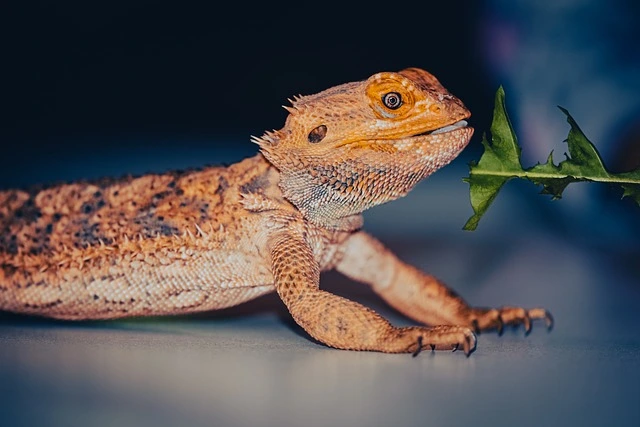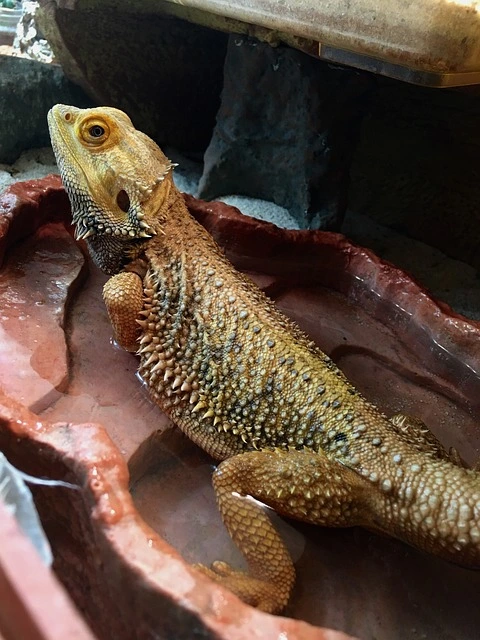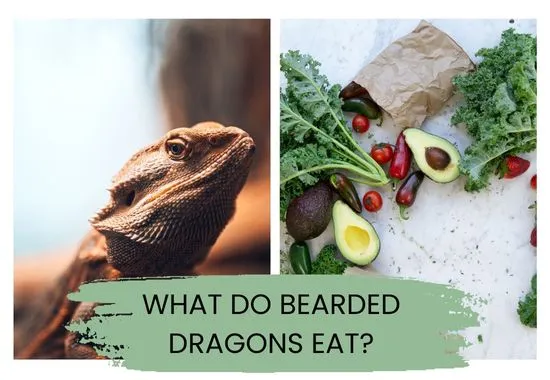Bearded dragons are wonderful, low-maintenance pets that are a joy to have around. They are relatively easy to care for, but one of the most important things you need to know about caring for a bearded dragon is what to feed them. In this blog post, we’ll give you a run-down of some of the best food options for your bearded dragon and explain why certain foods should be avoided.
For more detailed information on how to take care of your pet Beardie, read our Bearded Dragon Care Guide
What to feed a bearded dragon?
Bearded dragons are omnivores, meaning they need both plant and animal matter in their diet. A good rule of thumb is to aim for a diet that is about 20% protein and 80% vegetables.
Some great protein options for your bearded dragon include crickets, dubia roaches, earthworms, and mealworms (though only adults should eat mealworms).
| Safe to Eat | Unsafe to Eat |
|---|---|
| Crickets | Insects captured in the wild |
| Kingworms | Fireflies |
| Waxworms | Houseflies |
| Earthworms | – |
| Cockroaches | – |
| Locusts | – |
| Butterworms | – |
| Silkworms | – |
| Phoenix worms | – |
| Dubia roaches | – |
| Morioworms | – |
| Mealworms | – |
| Superworms | – |
Note: Waxworms and Morio worms are fatty and should only be fed as a treat. Mealworms and Superworms should only be fed to adult Bearded Dragons due to the risk of impaction.
Feeding Gut-Loaded Insects
It’s crucial to gut-load insects before feeding them to your bearded dragon. This involves feeding the insects a diet different from what you’re offering to your dragon that week. This way, when your dragon consumes the insects, they’ll also be getting the nutrients the insects have absorbed, adding diversity to their diet.
What fruits and vegetables can I feed my bearded dragon?
When it comes to the plant material in a bearded dragon’s diet, vegetables and flowers should make up the majority (80-90%) while fruits should only make up a smaller portion (10-20%). Leafy greens, such as those that are dark green, make up a large portion of their diet. You can also include yellow, red, and orange vegetables.
Here is a table with all plant material you can feed to your bearded dragon
| Staple foods | Occasional food | Only as treat |
|---|---|---|
| Collard greens | Cactus | Geraniums |
| Beet greens | Squash | Carnations |
| Mustard greens | Sprouts | Dandelions |
| Broccoli | Cooked sweet potato | Hibiscus |
| Turnip greens | Parsnips | Nasturtiums |
| Alfalfa hay or chow | Okra | Roses |
| Bok choy | Cucumber | |
| Kale | Asparagus | |
| Parsley | Mushrooms | |
| Watercress | Peas | |
| Clover | Corn | |
| Red or green cabbage | Apples | |
| Savory | Bananas | |
| Cilantro | Mango | |
| Kohlrabi | Grapes | |
| Bell peppers | Star fruit | |
| Green beans | Raisins | |
| Escarole | Peaches | |
| Figs | Guava | |
| Apricots | Kiwis | |
| Dates | Melons | |
| Raspberries | Tomato | |
| Strawberries | Carrots |

What not to feed a breaded dragon
There are also a few things you should avoid feeding your bearded dragon. Some foods bind to calcium and can lead to a calcium deficiency. Citrus fruits like should also be avoided as they can cause gastrointestinal upset. Overall, you want to avoid any fruits or vegetables with a high phosphorous to calcium ratio as this can be unhealthy for your pet. Some vegetables are simply too fibre-rich for beardies.
| Unsafe to Eat | Reason |
|---|---|
| Lemon | Can upset the dragon’s tummy |
| Orange | Can upset the dragon’s tummy |
| Iceberg Lettuce | Fiber-rich / Low nutritional value |
| Spinach | Can cause calcium deficiency and metabolic bone disease |
| Beet Tops | Can cause calcium deficiency and metabolic bone disease |
| Swiss chard | Can cause calcium deficiency and metabolic bone disease |
| Celery | Fiber-rich / Low nutritional value |
| Avocados | Contains chemicals that are toxic for Bearded Dragons |
| Rhubarb | Contains high levels of oxalic acid that are poisonous |
| Acken fern, buttercup, crocus, daffodil, holly, horse chestnut, ivy, oak and poppy | Poisonous |
How often should I feed my bearded dragon?
The frequency of feeding for a bearded dragon depends on their age and size. Here’s a general guideline:
- Hatchlings and juvenile bearded dragons (up to 1 year old): should be fed small insects, such as crickets or mealworms, twice a day.
- Subadult and adult bearded dragons (1 year and older): can be fed once or twice a day, with a larger portion size than for younger dragons.
It’s also important to remember that the amount of food a bearded dragon requires may vary depending on factors such as their activity level, temperature, and health. If your bearded dragon is looking thin, it may be necessary to feed them more often, whereas if they’re looking overweight, you may need to reduce the frequency or portion size of their meals.
How much water do bearded dragons need?
Bearded dragons need access to fresh, clean water at all times. Hydration is important for their overall health and well-being, and it helps regulate their body temperature, digest food, and eliminate waste. Here are some general guidelines for providing water to your bearded dragon:
- Offer water in a shallow dish that is big enough for them to soak in, but not so deep that they can become trapped.
- Change the water daily, or more frequently if it becomes soiled or contaminated.
- Provide a source of humidity, such as a misting bottle or a humid hide, as this will encourage your bearded dragon to drink.
- Offer water while they’re basking, as they are more likely to drink when they are warm and active.

It’s also important to note that some bearded dragons may not drink from a dish, and may instead get their hydration from the food they eat, such as leafy greens and vegetables. However, it’s still important to provide fresh water at all times, in case they do choose to drink or simply soak in it. If you have concerns about your bearded dragon’s hydration, it’s best to consult with a reptile veterinarian.
Do I need to give my bearded dragons vitamins and minerals?
Yes, it’s important to provide vitamins and minerals to ensure that your bearded dragon has a balanced diet and stays healthy. Here’s how you can do it:
- Calcium: Bearded dragons need calcium for strong bones and to regulate their muscles and nerves. Provide a calcium supplement, such as a powdered supplement, which can be sprinkled on their food or offered in a dish. Offer calcium supplements two to three times a week.
- Vitamin D3: Vitamin D3 helps your bearded dragon absorb calcium and is important for their overall health. Offer a vitamin D3 supplement, which can be found in a liquid form, in their food or water. Offer D3 supplements two to three times a week.
- Multivitamins: You can also offer a multivitamin supplement, which contains a blend of vitamins and minerals that are important for bearded dragons. These can be found in a liquid or powder form and can be sprinkled on their food or offered in a dish. Offer multivitamins one to two times a week.
It’s important to follow the recommended dosing instructions for any supplements you provide and to consult with a reptile veterinarian if you have any questions or concerns. Over-supplementation can be harmful, so it’s important to provide the right amount of vitamins and minerals to your bearded dragon.
